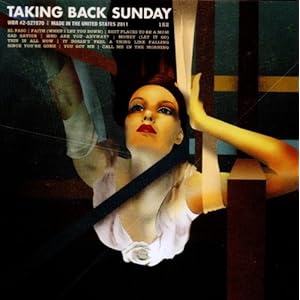 Whatever happened to emo bands? There was always something reasonably endearing about the best of them – whiny, sure, but so earnest and prone to literate ramblings that they seemed the perfect antidote for an indie scene that seemed to value ironic detachment much more than the nerdy kid’s lovelorn poetry, hastily scrawled onto tear-soaked notebook paper. Was it annoying after a while? It sure was, but you gotta admire these kids’ willingness to put aside rock-minded things like pride, bravado, and balls in favor of just putting it all out there.
Whatever happened to emo bands? There was always something reasonably endearing about the best of them – whiny, sure, but so earnest and prone to literate ramblings that they seemed the perfect antidote for an indie scene that seemed to value ironic detachment much more than the nerdy kid’s lovelorn poetry, hastily scrawled onto tear-soaked notebook paper. Was it annoying after a while? It sure was, but you gotta admire these kids’ willingness to put aside rock-minded things like pride, bravado, and balls in favor of just putting it all out there.
Long-since relegated to afterthought status, Taking Back Sunday coasted by on an awful lot of goodwill engendered by their first album, Tell All Your Friends, by all accounts a rocket fired directly into the huge hearts of morose young folks everywhere. Co-vocalist/guitarist John Nolan then took off to form the similar-minded Straylight Run (with a little more reliance on female backing vocals and pretty pianos, but similar nonetheless) and release one startlingly good album followed by an awful one; Taking Back Sunday soldiered on with lead vocalist/guitarist Adam Lazzara executing a revolving-door bandmate policy and making albums that varied in quality from pretty bad (New Again) all the way up to… still pretty bad (Louder Now). Long story short, there’s a reason TBS’s new record is called Taking Back Sunday – Nolan is back, the rest of the original line-up in tow, and as far as fans are concerned, they’re the real Taking Back Sunday for the first time since their debut.
This review isn’t written from an apologist; as a college student, I witnessed far too many scenester kids screaming in what seemed like agony to the astonishingly overblown lyrics of TBS’s most enduring song, “You’re So Last Summer”, for that. But with hindsight, I’ve been able to pinpoint its allure, and I understand it without necessarily sharing in it; here, Taking Back Sunday finally live up to their potential as a reliable provider of overstated emotions with a distinctly pop-punk core. It hits all the right emotional notes without ever becoming eye-rolling; and musically, this is just right. The album’s second track, “Faith (When I Let You Down)”, signals what is to come: agreeably mid-tempo power-pop, and agreeably shouted harmonies layered over huge choruses. It’s what’s not here that’s key – the lyrical content, often about regret and hope (with a few swipes at organized religion peppered in), lacks the dreadfully adolescent slant of previous material, and as their core audience tentatively enters real-adult world, that should be a relief to the grownup TBS fan.
The Taking Back Sunday template is well-worn, sure, and in full display this time around – arpeggiated or muted guitar strings inevitably build to hard strumming, while Lazzara and Nolan’s vocals are full-throated, ragged, and often more than a little bit tortured. But what works, works – it’s telling that the band’s one attempt to subvert the established formula, album opener “El Paso” (sadly, not the Marty Robbins cover one would hope), fails miserably in applying TBS’s strengths to a faux-metal throwdown. It’s tuneless and repetitive, and nothing like the pleasant pop-punk that follows, because it conveniently ignores this band’s devotion to a memorable hook.
The final song here illustrates the manifesto nicely: “Call Me In The Morning” opens like a musical summit between Green Day’s “Wake Me Up When September Ends” and U2’s “So Cruel” before the bass drum starts thudding (in that “I’m signaling a significant change in volume and dynamics” sort of way) and Lazzara/Nolan jump octaves for a soaring chorus. It may be juvenile, but for anyone who’s turned to music like this for any sort of comfort, it’s elating to see it reach for the stars. Taking Back Sunday may as well have been called Huge Hooks and Personal Pronouns, sure – but this is a perfectly likable throwback, tuneful and at least a little bit resonant, and the first time in their career the revitalized band have bothered marrying lyrics that people over 17 can enjoy with music that people, in general, can. That makes it their best work yet, and, hopefully, a positive harbinger of things to come for these adults that still know how to rock a chorus like a frustrated teen.
Grade: B

